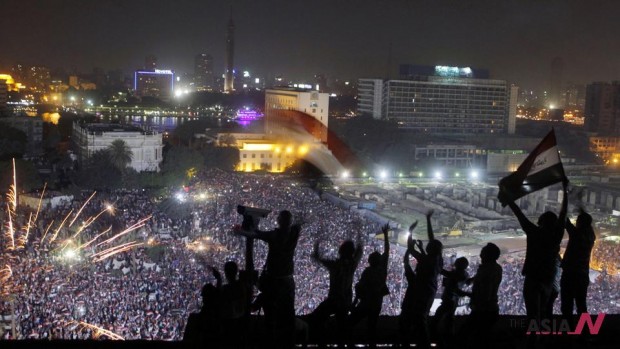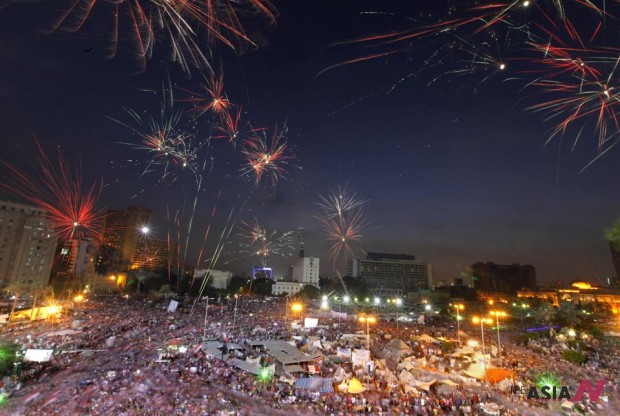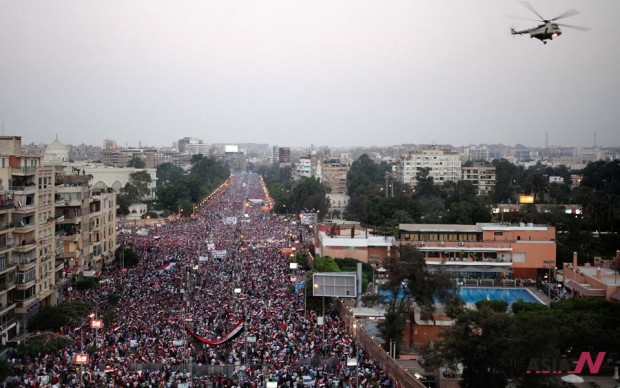Egypt: The tale of two revolutions
For most Egyptians, the past year was just a nightmare, and the worst, compared with any bad ruling authorities in the history of Egypt.
The country was under occupation of the Muslim Brotherhood ruling, embodied by the ousted Ex-President Mohammed Morsi Al-Ayat, who acted, for a year as a dictator by not responding the Egyptian people.
But the people have spoken, and declared their refusal, marched in millions to reject the occupation of Muslim Brotherhood of legislative, executive and judicial authorities, as they also announced their rejection of the defective humiliating constitution written and reviewed in hours to fasten the fist of the ruling dictator.
It started with the movement of Tamarrud (Rebellion) format paper requesting the signature of those who saw that Morsi could not succeed to do all promises given before presidential elections by him. The citizens, by signing Tamarrud were announcing their will to vote for an early presidential election.
The head of Egypt’s armed forces, Gen Abdul Fattah al-Sisi, announced a week period for all parties to gather and approve any sort of agreement between the presidency and the opposition. Refusing to answer that call, Ex-President Mohammed Morsi gave a speech refusing to accept but continuing to rule under the same conditions of neglecting other voices of reasons.
The long awaited statement came to give the relief feelings for the millions spread in streets formatting the most crowded demonstrations in the history, according to BBC, with more than 33 million in most of the Egyptian cities.
The head of Egypt’s armed forces Gen Abdul Fattah al-Sisi gave his statement that was broadcasted live on state TV:
“In the name of God, the Most Merciful, the Most Compassionate. Oh great people of Egypt!
As the armed forces cannot just turn a deaf ear and a blind eye to the movement and call of the Egyptian people, they have invoked their patriotic, and not political, role.
The armed forces themselves were, still are and will continue to be the first to announce their need to remain distant from political action.
Relying on their insightful vision, the armed forces have realized that the Egyptian people, who are calling on us to come to their support, are not in fact calling on us to assume power.
Rather, they have called on us to perform public service and to secure essential protection of the demands of their revolution. Such is the message which the armed forces have received from across Egypt’s urban centers, cities, villages.
The armed forces have comprehended this appeal, understood its intention, and come to see its necessity. We have drawn closer to the political scene, motivated by hope and willingness and stressing commitment to every sense of duty, responsibility, and faith.
Over the past few months, the armed forces have exerted tremendous efforts, both directly and indirectly, to contain the domestic situation and conduct national reconciliation comprising all the political forces, including the presidential institution. In November 2012, the armed forces called for a national dialogue, to which all the national and political forces had responded, but which was rejected by the presidency at the last moment.
Subsequent calls and initiatives have been put forward since then. The armed forces have on several occasions presented a strategic assessment on the domestic and foreign levels, addressing the most pivotal challenges and dangers facing the homeland on the economic, security, political, and social levels.
We have also presented the vision of the armed forces, as a national institution, as to how to address the factors leading to social divisions; how to remove tension; and how to confront the challenges and dangers in order to end the current crisis.
As parts of the efforts exerted in response to the current crisis, the General Command of the armed forces held a meeting with the president of the republic in the Quba Palace on 22 June. The armed forces expressed their opinion and conveyed rejection of inflecting harm on the state’s national and religious institutions.
We also expressed rejection of attempts to intimidate or threaten the Egyptian people. There was hope that national accord would be achieved to delineate a roadmap and to give the people a sense of trust and reassurance, in addition to stability, in a way that secures their hopes and aspirations.”
However, the speech which the president made last night before the expiry of the 48-hour deadline failed to meet the overall demands of the people, prompting the armed forces – in compliance with their historic and national duties – to consult with some figures representing political, national, religious, and youth forces without excluding any party.
The parties present agreed on a future roadmap containing initial measures which ensures the construction of a strong and coherent Egyptian society which does not exclude any of its members and trends, and which ends the state of conflict and division”.
The roadmap announced in the statement included the following:
• The Constitution shall be temporarily suspended
• The head of the Supreme Constitutional Court shall take oath before the court’s general assembly
• Early presidential elections shall take place
• The head of the Supreme Constitutional Court shall run the affairs of the country during the transitional period until a new president has been elected
• The head of the Supreme Constitutional Court shall have the authority to pass constitutional declarations during the transitional phase
• A national technocrat government – which shall be both strong and competent – shall be formed and shall enjoy all the powers needed to run the current phase
• A committee shall be formed comprising figures from various expertise and spectrums to review the proposed amendments to the Constitution, which has been temporality suspended
• The Supreme Constitutional Court is hereby urged to pass the draft law on parliamentary election and to embark on preparing for parliamentary election
• A media charter of honor shall be designed in a way that ensures media freedom; observes professional rules, credibility, and neutrality; and advances the homeland’s top interests
• Practical measures shall be taken to empower young people and integrate them into the state’s institutions so they can be partners in the decision-making process on the various levels of the executive authority
• A higher committee for national reconciliation shall be formed. The committee shall comprise figures who enjoy credibility and acceptance from all national forces, and who represent all affiliations
The Armed Forces hereby called on the “great Egyptian people, with all their affiliations, to ensure the peacefulness of the demonstrations and avoid violence as it only leads to further tension and to the shedding of innocent blood. We hereby warn that – in co-operation with the elements of the Ministry of the Interior and in accordance with the law – we will stand firmly and decisively against any forms of painlessness in fulfillment of our historic and national responsibilities. The armed forces hail the honest and dedicated elements of the forces, the police, and the judiciary for their great national role and their continued sacrifices to maintain the safety and security of Egypt and its great people. May God protect Egypt and its glorious great people. Peace be upon you.”
Al Jazeera Media Crime!
In an immediate reaction, from the isolated President, a videotape aired by Al Jazeera, loyal to the Muslim Brotherhood that “the statement announced by the General Command of the Armed Forces represent a military coup is unacceptable.”But, it was discovered that the videotape was just a training session of the old speech, given by the Ex- President, a day earlier. For that reason, authorities rush to shut down the local office of “Egypt Direct Al Jazeera TV channel”, asking them to show the permits given for establishing that office.
The demonstrators chanted slogans in favor of the armed forces and fired fireworks in Tahrir and other squares of Egypt, while passing cars rushed in the streets playing horns and raising Egyptians flags from the balconies and windows in a scene repeating the of memory scenes of February 11, 2011, when the former President Hosni Mubarak announced his departure of ruling authority. Helicopters of the army over Tahrir and other Squares were widely acclaimed by protesters.
The two revolutions, January 25, and June 30, were landmarks in the modern history, not only in Egypt, but in the region and the world. That was the reason of the US state of denial to accept the clear truth: Egyptians started the first revolution for certain reasons, and when the democratically elected President could not apply any of the promises and goals, then comes the second revolution and this is simply the tale of twin revolutions, the simple tale of a great idea, and greatest action.
In a comment on my facebook page I wrote: “Muslim Brotherhood was just like a USB flash memory. It could not have space enough for the greatness and beauty of Egypt, and the result was the burning of that flash memory”.
Was this true? I leave answers for readers and events to come.

















































































Correct me if I err, but did not the Supreme Constitutional Court work with Sisi to depose Morsi from the presidency?